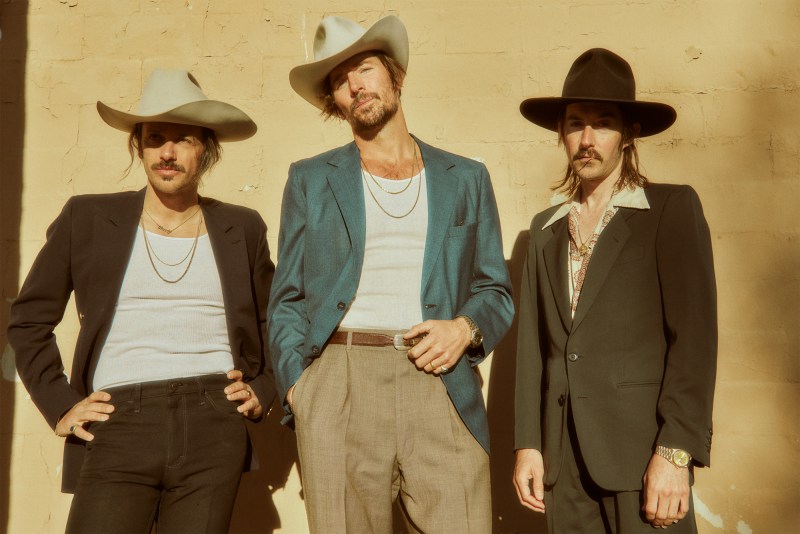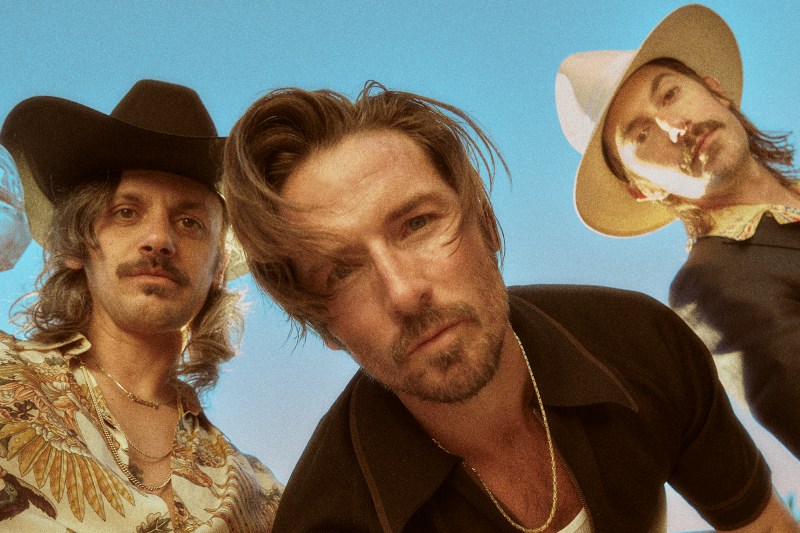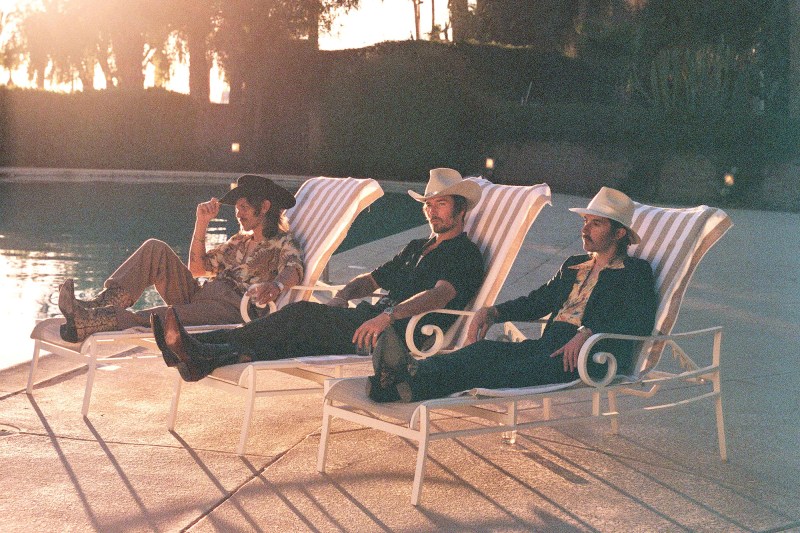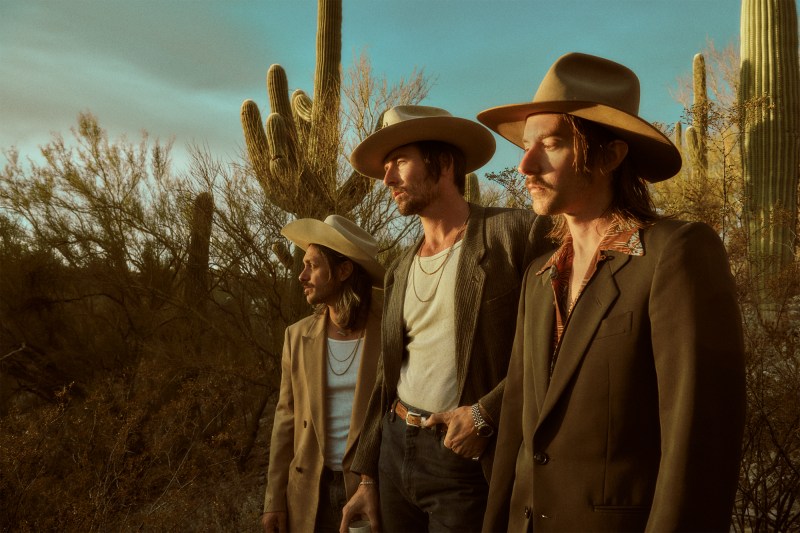
It’s been a quiet year, Mark Wystrach tells The Manual over the screaming in the background. The Midland frontman is at his father-in-law’s ranch a half-hour from Boulder, Colo., wrapping up a six-week sojourn, and there are an unspecified number of children racing in and out of the phone’s radius, shrieking and coming close to impaling themselves on farming implements. Periodically he asks someone — maybe his wife, Outdoor Voices founder Ty Haney — to wrangle them. The couple had their first child in late 2019, just before his band’s sweetheart run came to an abrupt halt.
“I get a call at 2:45 in the morning — I get eight or nine calls at the same time — saying you’ve got to rush home, they’re closing the borders,” the 41-year-old, who was touring Europe at the time, remembers. “We were on our way to breaking through and becoming superstars. That was the goal. And everything was completely derailed.”
Related Guides

Born and raised in Tucson, Ariz., Wystrach came to professional musicianship later in life, first heading to Europe after college for a modeling career. And in that, he was successful, appearing in campaigns for Dior and other major brands before returning to the States to pursue music instead. It was in Los Angeles, a place where he didn’t know a soul, that he almost immediately fell into friendships with his future bandmates. Cameron Duddy, son of a cameraman and an established director in his own right (Bruno Mars’ Uptown Funk and 24K Magic videos, to name a few), and vintage clothier Jess Carson were soon in and out of each other’s various music projects even as they all maintained independent careers. (Wystrach himself began acting, landing a guest spot on CSI: Miami and a recurring role in the soap opera Passions.) But it took them coming together at a central location — Jackson, Wy., for Duddy’s wedding to photographer Harper Smith — that they finally slowed down. There, in the shadow of the Tetons, they sat on a porch, played some old songs, and conceived of a band based around California country music: the Eagles and Merle Haggard. After, they all moved to a small town outside of Austin, Tex., to see if their idea had legs.
“For me, it was a return to the roots,” Wystrach says of leaving L.A. He grew up in a town with a single stop sign, and driving meant dodging semitrailers loaded with produce traveling north from the Mexican border. The little Texas compound the band hunkered down in (Duddy was the technical owner, with Wystrach living above their dedicated practice space) was insular, with days spent writing, save for the times when the group was out trying to book gigs at the local Austin honky tonk bars. “It was a simple time,” he says. “It’s crazy that seven years have passed.”

There’s been a lot packed into those seven years. Signed to former Taylor Swift promotion mechanism Big Machine, the band released its debut eponymous EP in 2016 to wide acclaim. They followed up with their first record, On the Rocks, which earned them two Grammy nominations. They kept touring the U.S. and then the world, supporting artists that needed their young looks and an old sound. And they kept writing and recording, soon releasing their sophomore effort, Let It Roll, in the summer of 2019. More touring, more travel. Marriage, The Tonight Show with Jimmy Fallon. GQ and Vogue. Red carpets. Births of children. More and more and more.
“It’s a grind,” Wystrach says, “and once you get thrown into that, there’s no turning back.”
At first, the 2020 shutdown felt like their breakthrough, within their grasp, had been snatched away. Their last show was for 80,000 fans; they were not contending with quiet homes and idle hours. “There was that sense of loss and frustration,” he says. “We’re worker bees, and we love doing what we do, but then, as Bruce Lee used to say, you’ve got to be the water, not the rock. You’ve got to take the cards you’ve been dealt and make it work.”

With the freeze in place, Duddy and Carson returned to their homes, but for Wystrach, he and Haney had to find their own. After floating from place to place, they found a 1930s hacienda made of adobe not far from where he grew up, in the foothills of Arizona’s Santa Cruz mountains. They hiked, and on weekends they would visit his family to feed the cattle. “It’s removed from the fast pace of my day-to-day life, when I’m Mark from Midland,” he says. “It’s reminded me what’s important: The music, my family, and our fans.
“In hindsight, it’s one of the greatest gifts that this band’s been given,” he continues. “That respite truly recharged us.”
After more than a year away, Midland has slowly returned to shows, headlining their own gigs rather than as support. “The crowds have been absolutely feverish,” Wystrach says. To prepare for a run of dates and the punishing two-hour sets standard for headliners, the band has been training like Olympians. They also released an EP on July 16 called The Last Resort, which features five songs from an upcoming full-length record expected in early 2022.
The inspiration for Resort, as cliché as it may sound, comes from the band itself. Locked down and with nothing to do, they began meeting for Zoom songwriting sessions two or three times a week while concurrently working on a documentary and accompanying soundtrack. That latter project, titled Midland: The Sonic Ranch Documentary and released in March 2021, is a retrospective of the band in its early Texas days, with themselves recording the first fruits of their songwriting efforts before the fame came. It’s a time capsule unearthed to find them in all their sun-soaked California country glory, with tight three-part harmonies and the gauntness of the ambitious and obsessed. Even as poring over the old footage eliciting some nostalgia for the days of yore, Wystrach says it was inspirational, as he felt those same writing and performance muscles, once in their infancy, now in more robust and developed form. “You’ve been working on your craft and growing as a songwriter, growing as a human, the memories you’ve had,” he says. “All of that combined with the nostalgia was going into this songwriting.” And so Midland, a band based on the old country sound, found its today influenced by its own past, which inspired songs for the future.

It’s strange that an EP has such a strong name without an accompanying track, but Wystrach explains that its name will be from the titular track of their upcoming record. Written in collaboration with Josh Osborne (Kacey Musgraves, Sam Hunt) and LANY co-writer Shane McAnally, it was the first in those early days of the pandemic and captures all of the time’s uncertainty. “It was reflective of the strange, exotic place that felt like the end of the line, the last place you’ll ever wind up,” Wystrach says. “It did feel like the end, and it set the pace for the rest of the songs we’d write.”
With the world opening up and Midland releasing new music, Wystrach can’t help but feel the shift again, this time from the calm respite to the well-worn thrum of touring life. But the feeling now, with time to reflect, is distinct. “Midland is approaching this with gratitude,” he says. “I’m riding the ride, and you can see a big smile on my face. It feels like a second chance.”



